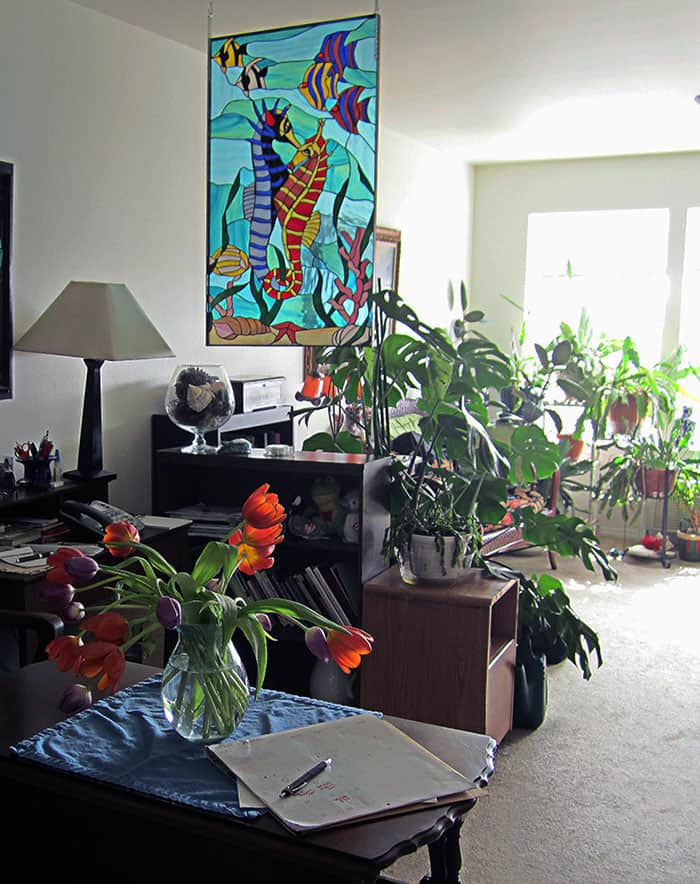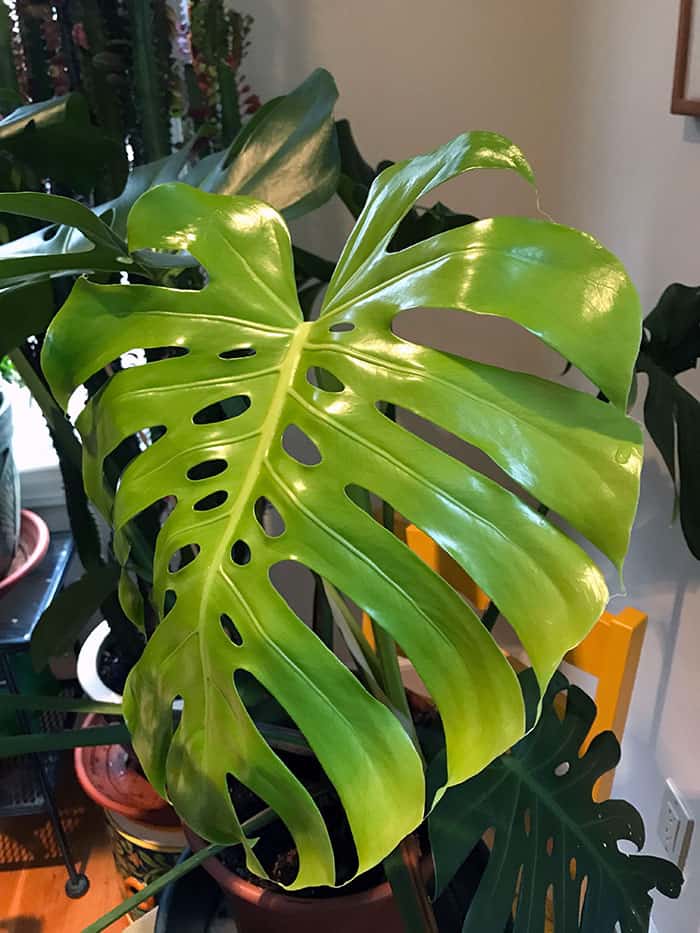Imagine: You can tell that Monstera deliciosa is a hot plant right now…not many houseplants have their own hashtags. Perhaps this is a signal that tropicals are indeed “the new succulents.” Maybe it’s a case of everything old being new again…I remember the days when the leaves were all over 1950’s wallpaper and drapery fabric. Or perhaps it’s just because the hashtag, #MonsteraMonday, has that lovely alliteration.
My Monstera is a sentimental plant for me having nothing to do with the wallpaper of my youth. My plant is a piece that my grandmother, Dorothy Young, brought back to Colorado after a trip to Hawaii in the 1960’s. Those where the days when plants flowed into and out of Hawaii with abandon, and this plant, native to the tropical rainforests of southern Mexico and Panama had already started to run amuck on the islands. It was lush, tropical and sculptural, so of course my grandmother brought a piece home.
At some point my mother, Janice Albertson, took a piece of this plant to Stevens Point, Wisconsin. For years she had it growing at the top level of her A-frame cottage. The plant grew vines along the railings of the loft, and the huge leaves turned toward the south-facing windows. Arial roots hung down into the living room below. This large Monstera, which my mother called a split-leaf philodendron, was the plant that gave my mother’s cottage the feel of a jungle.
When my mom moved into an assisted living apartment she took many of her plants with her, and the Monstera was chief among them. I visited her three or four times a year and one of my jobs during those visits was to create even larger supports for this plant as it grew. Mom frequently left her apartment door open, and people would wander into her room thinking it was the facility’s greenhouse. Frankly, it was.
Now I have a piece of that plant. My mom’s been gone for almost two years now, but every time my Monstera grows new foliage, I hear my mother. “Oh, look! It has a new leaf.” #MonsteraMonday will always be #MomsMosteraMonday to me.

This photo was taken when my mother’s plant was fairly small. Over the years it came to dominate her small living room.
Name: Monstera deliciosa aka split leaf philodendron, even though this plant is not in the genus Philodendron at all. True Philodendron don’t have the holes in the leaves that Monstera develop as they grow mature. These holes allow winds to pass through the large leaves, and are probably one reason that this vining plant lives through hurricanes so well. In fact, in addition to being called “Swiss cheese plant,” Monstera is also referred to as “hurricane plant” in some areas.
The species name, deliciosa, refers to the fruit which is said to taste like fruit salad. The genus name refers to the overall size of the plant.
Type of Plant: A tropical plant that scrambles up trees in the rain forest, but has become a popular, large houseplant and resident of tropical conservatories throughout the world.
Why I love this plant: The leaf shape is so unusual that it’s no wonder it’s caught the attention of artists and designers for decades. And, of course, I love it because it reminds me other my mother and grandmother.
A Word to the Wise: This plant seldom flowers in home conditions, so don’t grow one thinking that you will get fruit. Also, don’t allow it to take over your home. Unless you have a loft with a railing, like my mother did, you’ll want to periodically cut it down and keep it supported or contained. Don’t hesitate to trim off the aerial roots that can develop…it doesn’t hurt the plant to trim them. If you prune your plant back the cuttings are easily started by sticking them directly into new, damp potting soil.
If you can move your plant it can go out in the shade over the summer but don’t put it in direct sun. Water an indoor plant about once a week and fertilize a couple of times per year.

This plant is quite small – I’ve cut my Monstera down at least twice already so it won’t take over the house.

When the leaves first open the spaces on the edges are still attached to each other. This tread of tissue falls away quickly, however, so watch for it on the new leaf. I this “Delicious Monster” Plant.

From where i can buy Monstera????
If you can’t find it at your local garden center, there are on-line suppliers. https://www.logees.com/browse-by-botanical-name/monstera.html
or https://amzn.to/2lBCvP4
My monsteras are monsters…how do I cut them down?
You can cut them in half, but what many people do is take a piece off the top that’s about two or three feet tall, apply rooting hormone on the bottom and put that branch in a pot with fresh potting soil. Water well and it will root – then you have a new, fresh, smaller plant going in new soil. At that point you say goodbye to the old, too big plant.